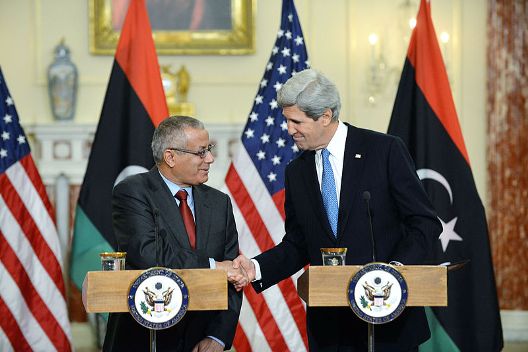 In recent weeks Libya has reclaimed space in the international media spotlight for concerning reasons. Thursday evening warring militias brought gun battles and anti-aircraft fire to the streets of Tripoli. A breakaway government in the East, militia blockades of oil facilities, multiple successful and attempted assassinations of political and military figures, and ultimately the brazen kidnapping of the country’s prime minister have revealed the highly unstable security situation in this post-Arab Spring nation. This trend sparks concern about the Libyan authorities’ ability to create lasting security, a prerequisite for meaningful work to facilitate a democratic transition. Prime Minister Ali Zidan on Sunday warned about the prospect of Iraq-style foreign intervention in Libya, a last-ditch effort to try and rally the public to stand against the militias, but Zidan recognized the need for greater international support when he appealed for training and technical assistance almost five months ago.
In recent weeks Libya has reclaimed space in the international media spotlight for concerning reasons. Thursday evening warring militias brought gun battles and anti-aircraft fire to the streets of Tripoli. A breakaway government in the East, militia blockades of oil facilities, multiple successful and attempted assassinations of political and military figures, and ultimately the brazen kidnapping of the country’s prime minister have revealed the highly unstable security situation in this post-Arab Spring nation. This trend sparks concern about the Libyan authorities’ ability to create lasting security, a prerequisite for meaningful work to facilitate a democratic transition. Prime Minister Ali Zidan on Sunday warned about the prospect of Iraq-style foreign intervention in Libya, a last-ditch effort to try and rally the public to stand against the militias, but Zidan recognized the need for greater international support when he appealed for training and technical assistance almost five months ago.
NATO member states including the United States, Turkey, Italy and the United Kingdom have initiated small-scale military trainings with Libya, all occurring outside the country. While these efforts may provide incremental support in the long term, in the short term Libya faces an imminent threat of government and state failure. The international community’s focus on limited-scope efforts has cost Libya in one essential currency: time. The longer the new government takes to complete a constitution and government structure, the more legitimacy it loses. But its actions are limited by militias who target politicians and attack government interests with impunity. Rampant militias hinder the Libyan government’s ability to build effective security institutions—which it desperately needs to maintain legitimacy—but the lack of security reinforces and strengthens militias as the only real alternative. How can Libyans be expected to make progress in developing their government when faced with this destructive feed-forward mechanism?
Given the highly unstable situation, intervention by select regional neighbors alongside technical assistance from NATO may be needed to break the cycle of insecurity—or at a minimum provide time for the Libyan authorities to decide upon and implement independent security structures. States who share Libya’s Muslim identity (such as Morocco, Jordan, Turkey, and Pakistan) could provide police assistance on the ground in Libya via bilateral agreements, limited solely to protecting government agencies and officials, diplomatic establishments, and members of the judiciary. NATO could provide the background technical assistance to coordinate such an effort, and thus strategically avoid any US and European boots on the ground—a measure that would undoubtedly be seen by the Libyan public as undue neocolonial influence. Though greater outside involvement will undoubtedly be met with some indignation, the escalating trend of rampant violence coupled with the inability of the government to respond effectively signals the need for international police support to give Libyan officials enough breathing room to make progress towards regaining legitimacy.
NATO’s military involvement in 2011 played a crucial role in toppling the regime, but the organization subsequently ceased nearly all security support immediately following the fall of Qaddafi. NATO’s recent agreement to advise Libya on defense institution-building is a good first step, but the “small advisory team” is neither immediate nor substantial enough to make a significant impact in the near term. By providing overarching technical support and logistics to regional states with an interest in a stable Libya, NATO members could enhance Libya’s prospects for security—which borders several European and Mediterranean states—without placing undue strain on the relationship and more easily managing expectations.
If Morocco, Jordan, Turkey, or other neighbor states can provide police support on the ground, Libya’s government would have a chance to develop and implement strategies to disband the militias and build effective and cohesive civilian-led military and security apparatuses. International security assistance on the ground may be one of the only options left for the fledgling government to regain popular legitimacy and make progress towards a functional government.
Anna Lund is a research intern with the Atlantic Council’s Rafik Hariri Center for the Middle East.
Image: US Secretary of State John Kerry shakes hands with Libyan Prime Minister Ali Zidan after addressing reporters at the US Department of State in Washington, DC, on March 13, 2013. (Photo: US State Department)

